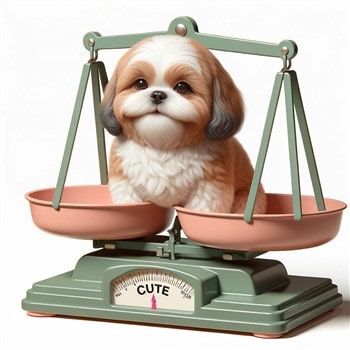How to Help a Shih Tzu Puppy Gain Weight

Overview
- The difference between not gaining fast enough and normal stalls
- Reasons why a Shih Tzu puppy may not be gaining weight as fast as he should
- Steps you can take to help your Shih Tzu gain weight, even if they are a picky eater
Please note: AllShihTzu is reader-supported, and some of the product suggestions on this page are affiliate links. As an Amazon Associate we earn from qualifying purchases. This is at no extra cost to you and helps keep this site running.
Not Gaining Weight Fast Enough vs Stalls In Weight Gain
Reasons Why a Shih Tzu Puppy May Need Help Gaining Weight
Keeping in mind that most Shih Tzu puppies are going to be plodding along on their own individual course and intervention won't be needed, there are several valid times that call out for some help in this department.
#1 Reason: Appetite can't keep up with growth. Normally with pups, a growing body in need of fuel triggers the appetite, and those puppies eat enough to supply the body with what it needs.
What to do: Read on for more reasons, or jump to How to Help a Shih Tzu Puppy Gain Weight.
How to Help a Shih Tzu Puppy Gain Weight
1) Offer a more nutrient-dense, health food.
2) Offer a nutritional weight gain supplement for puppies.
One of the most effective, and easy methods to help a puppy gain weight is to offer a nutritional supplement. This is because one of the main elements with lack of weight gain is that a little puppy cannot be expected to eat a large amount of food.
Getting more calories into your sweet Shih Tzu puppy can be accomplished with a tasty nutritional gel. Quality ones are formulated to tempt a pup with yummy flavor, and the gel will not make their tummy feel full.
An effective supplement that we recommend is Tomlyn High Calorie Nutritional Gel for Puppies, which offers 28 calories per serving; this is quite helpful for a tiny pup that's struggling to gain.
Small puppies only need about 55 calories per pound of body weight. So, in looking at a 4 lb. Shih Tzu pup, they would need about 220 calories per day. A boost of 28 calories means a 12% increase. Double the dose, giving a teaspoon twice per day, and their intake goes up 24%.
Food Related Articles:
The Best Fish-Based Treats for Shih Tzus – Many Shih Tzu dogs just can't say no to fish. Whether you're working around allergies or looking for a super-healthy option that keeps your Shih Tzu happy, check out these top treats packed with omega-3.
Top Treats for Shih Tzus with Sensitive Stomachs – If your Shih Tzu has a tummy that’s quick to protest, finding the right treat can feel like a guessing game. Thankfully, there are gentle options that dogs find super-delicious. See our list of the best belly-friendly treats.
More Helpful Articles for You:
Shih Tzu Supplies - Having the right items can improve everything from how your Shih Tzu does when home alone, to their success with housebreaking, and can even help prevent tracheal issues. See what is needed and why, for optimal health, comfort, safety and happiness.
10 Must-Haves Under 10 Buckaroos - On a budget but still want the best for your Shih Tzu? These clever care items are all easy on the wallet and big on everyday comfort, convenience and cuteness.
Genius Gadgets That Make Life with a Shih Tzu Easier - Clever tools, handy devices, and helpful doodads that make daily routines easier and a whole lot more fun for both you and your little guy or gal.
